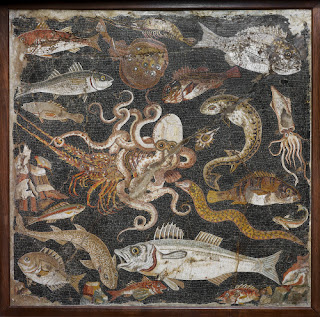After a week of waxing lyrical about 'Life and Death in Pompeii and Herculaneum', it's back to business, or rather back to the kitchen. To coincide with the Podcast History of the World's introduction to the Greeks, in response to several requests on Twitter, Facebook, and via email, and simply because it's about time, we're going to spend the next month cooking up some fish! The first three recipes are Greek, prepared with the frugality characteristic of their cuisine. Each dish kicks it up a notch, adding a little bit more and a little bit more, until we come to our final fishy feast, which is Roman. So far we've only encountered fish fermented and poured from a bottle - we know the ancients loved that, but what did they make of the real thing?
"What other craft gets youthful lips burning, gets their fingers fumbling, has their lungs gasping for air, in their haste to swallow? And isn't it only when it's well-supplied with fish that the agora brings about liaisons?" - Anaxandrides, Odysseus, fr. 34 K-A
What we learn from Anaxandrides, who describes the fish-monger and his art in almost sexual terms, is that it is fish which brings people to the market, and fish which gets them excited. Given that the Greeks populated rocky outcrops and rugged islands, it shouldn't be surprising that many of them relied on the sea for food, and the reverence with which they speak about fish becomes all the more understandable. Fish pervades not just Greek cuisine, but Greek literature and language too. To get a sense of just how much this is true, I implore you to pick up a copy of James Davidson's excellent 'Courtesans and Fishcakes', a book which explores 'the consuming passions of classical Athens'.
 |
| Fish Mosaic from Pompeii ©SANP |
Many modern commentators like to stress that Rome wasn't quite so taken with fish as the Greeks; sometimes they even paint a picture of Romans turning their noses up at seafood! Quite honestly, I am not sure where this attitude stems from, as Apicius alone has close to one hundred seafood recipes. However, since Rome had plenty of fertile fields (in contrast to the mountainous, rocky Greek countryside), it wasn't quite so reliant on the sea as the Greeks were. Thus, at Roman dinner parties, fish is usually served as an appetizer, with meats such as pork taking centre stage. Still, you only have to look at the mosaic above to know that the Romans, too, were rather fond of the fishies. Hopefully you will be too!


interesting blog. Were dried fish common? These would have allowed for both transport and storage - still the case here in Burundi where most of the country is without electricity, and dried fish are quite popular.
ReplyDeleteA message from Burundi? Awesome!
DeleteSalt-fish (dried and preserved in salt) was the most common variety, and by far the cheapest. The Greeks had a saying, 'cheaper than salt fish', meaning that something was very common.
As common as it was though, it still wasn't something which everybody could afford to eat.